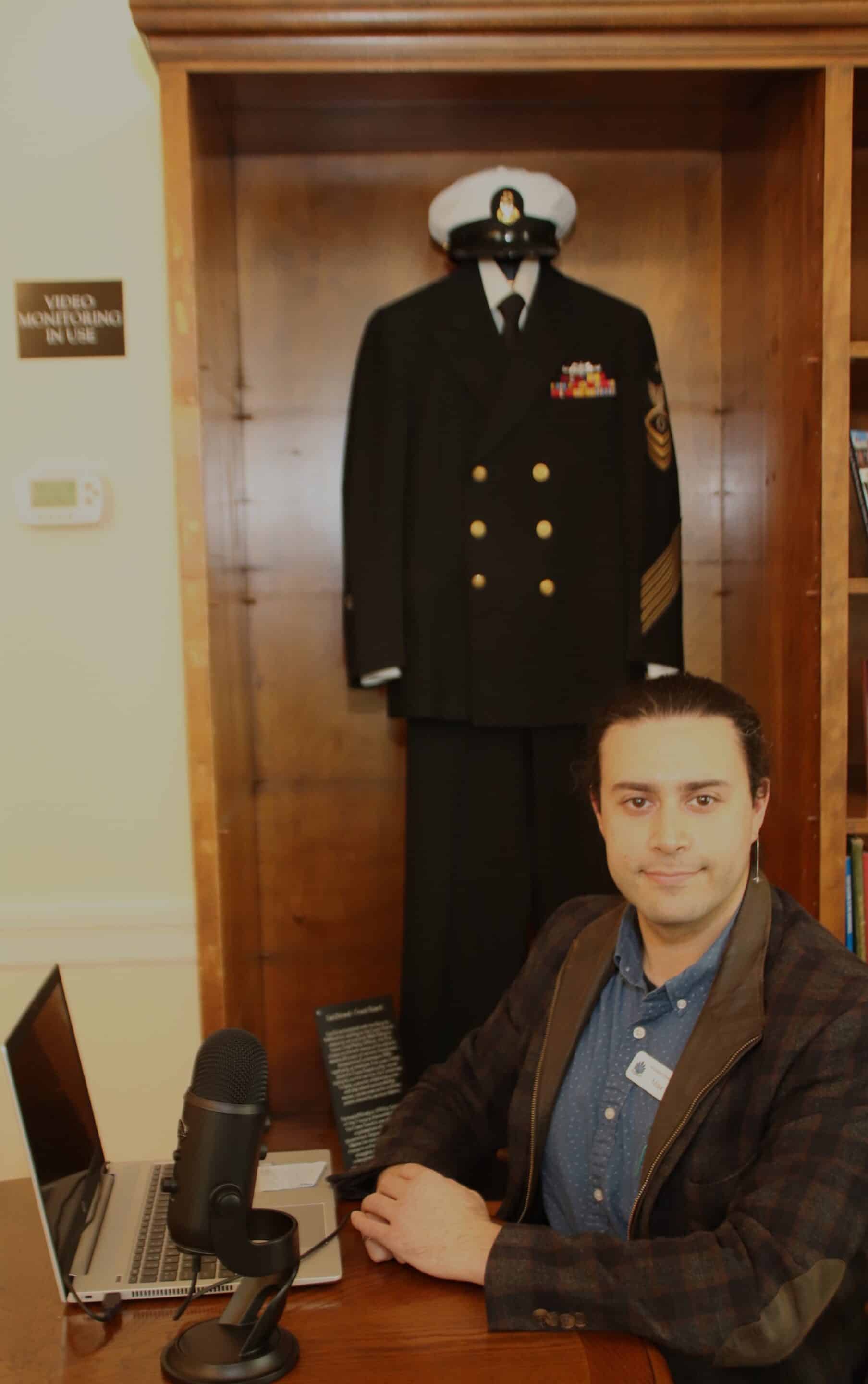Max Vivacqua, the Westfield Athenaeum’s archivist, is recording oral histories of Westfield veterans to preserve their military stories and legacies for future generations.
Reminder Publishing photo by Mike Lydick
WESTFIELD — The Westfield Athenaeum is working to help city veterans preserve their military stories and legacies for future generations through a new project.
Max Vivacqua, the Athenaeum’s archivist, is filming and recording oral histories of Westfield veterans. He said this is a “golden opportunity” for veterans to have their stories recorded for the historical record and shared with the community.
“The oral history format is uniquely suited to this type of preservation work,” said Vivacqua. “It allows future generations to hear directly from these individuals about their lives and experiences.”
The Veteran Oral History Project was launched in the summer of 2023 to complement the opening of a veterans exhibit in the Athenaeum’s Elizabeth Stewart Reed Room. The exhibit, which incorporated other display cases around the library, was a history of Westfield residents military service from the American Revolution to the Persian Gulf War in the 1990s.
Titled “Courage in Action: Two Centuries of Service by Westfield Veterans,” the exhibit featured uniforms, artifacts, photos and medals from the Athenaeum’s archival collections.
“It focused on the narrative journey of these individuals in service to their country,” said Vivacqua. “We decided to launch the oral history component alongside this exhibit to continue to build on and preserve the history of the Westfield community.”
While he has conducted only a few interviews so far, Vivacqua is in the process of setting up several others.
“Individuals I’ve spoken with at this stage in the project have served in the post-Cold War era, but we welcome anyone who would like to share their story,” said Vivacqua, who recently did a Zoom interview with a Westfield veteran now living in Washington state.
Vivacqua said that as veterans from the Vietnam generation enter their retirement years, it’s increasingly important to preserve the history of those interested veterans — and their experiences in a world with a much different geopolitical landscape than today.
“On the other side of that coin, the majority of our collections overall as archives tend to be pre-1970s. We’re constantly discussing the importance of incorporating modern day narratives and events that contextualize more recent history, especially as our country moves forward from the past 20 years in Afghanistan and Iraq,” he said.
With the project intended to grow as it continues, Vivacqua said there is a large amount of trust being asked of Westfield’s veteran community to share their experiences — especially given tendencies to politicize historical events and narratives, or take them out of context.
“Our intent is to offer a space in the historical record for individuals to share their experiences and stories so they may help future generations of Westfield residents understand these members of their community and their varied experiences. As we work with more interested individuals, we hope to be able to build on that trust,” said Vivacqua.
He has been working with the Athenaeum’s technology services librarian so the public can view these interviews. If permission is given by a participant, edited versions of the interview will be shared on the Athenaeum’s website, Facebook page and YouTube channel. Vivacqua said veterans also have the option to restrict access of their interview until a future date.
When discussing the feasibility of undertaking the project, the Athenaeum staff conferred with Julie Barnes, the city’s director of veterans services. “Everyone working with Veterans Services has been very helpful and has been able to answer many of our questions,” said Vivacqua. “It also helped to shape the direction of the project to best represent our veteran community.”
Barnes said that by sharing their stories, veterans may help themselves process and understand their experiences and help others get a glimpse into military service.
“From Purple Heart recipients with tales of life-threatening wartime injuries, to heartbreaking accounts of veterans separated from loved ones while serving their country, these oral histories will expose the audience to a story that might not otherwise be told and a perspective the civilian audience might not experience,” she said.
Vivacqua said if anyone is unsure about sitting for an interview, there are many options for sharing stories with the Athenaeum’s archives. He said written stories, artifact donations, or family histories are also accepted.
“An important part of what I do here is to work with our patrons to find the best way for them to enter into the community history stored at our archives.”
In addition to the oral interviews, the Athenaeum is opening its archives for donations of items veterans would like to see preserved, such as photographs, service records, medals or other small artifacts. Larger items, such as uniforms, may be considered for inclusion in the collection based on the needs of the Athenaeum.
“We are very thankful to our veteran community, both current and past, for their historic donations,” said Vivacqua. “We house collections dating back through most major conflicts, from the American Revolution until the Persian Gulf War, which is a history and legacy that we are fortunate to be stewards of.”
Vivacqua said one of the most interesting collections dates back to the post-Civil War days. The Athenaeum has a collection of about 20 encampment ribbons from the Grand Army of the Republic, a fraternal organization composed of veterans who served in the Civil War. The ribbons signify the annual reunions of veterans after the war ended.
More recently, Vivacqua worked with an individual to store and preserve her uncle’s U.S. Army Air Force uniforms from World War II. He served as a pilot on a B-17 bomber.
For more information about the oral history project or about donating a veteran item, contact Vivacqua at 413-568-7833, ext. 110, or at mvivacqua@westath.org.


